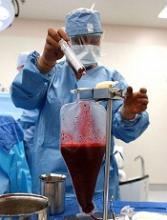User login
The European Medicines Agency’s Committee for Medicinal Products for Human Use (CHMP) has recommended approval for treosulfan (Trecondi) as part of conditioning prior to allogeneic hematopoietic stem cell transplant (allo-HSCT).
The full indication is for treosulfan to be used in combination with fludarabine for conditioning prior to allo-HSCT in adults with malignant and non-malignant diseases and in pediatric patients older than 1 month who have malignant diseases.
The CHMP’s recommendation for treosulfan will be reviewed by the European Commission, which has the authority to approve medicines for use in the European Union, Norway, Iceland, and Liechtenstein.
The European Commission usually makes a decision within 67 days of a CHMP recommendation.
The CHMP’s opinion of treosulfan is supported by results from a phase 3 trial (NCT00822393), which were presented at the 2017 ASH Annual Meeting.
In this trial, investigators compared two conditioning regimens, treosulfan-fludarabine and busulfan-fludarabine, in elderly or comorbid patients with acute myeloid leukemia or myelodysplastic syndromes who were undergoing allo-HSCT.
The ASH data included 476 patients from the final analysis.
Investigators said safety results between day -6 and day +28 were similar with the two regimens.
The same was true for trilineage engraftment and the cumulative incidence of relapse/progression at 24 months after allo-HSCT.
However, survival rates were higher in the treosulfan arm.
The event-free survival at 24 months was 64.0% in the treosulfan arm and 50.4% in the busulfan arm (P=0.0000164). The overall survival at 24 months was 72.5% and 56.4%, respectively (P=0.0082).
Transplant-related mortality at 24 months was 11.3% in the treosulfan arm and 28.2% in the busulfan arm (P=0.0201).
This trial was sponsored by medac GmbH.
The European Medicines Agency’s Committee for Medicinal Products for Human Use (CHMP) has recommended approval for treosulfan (Trecondi) as part of conditioning prior to allogeneic hematopoietic stem cell transplant (allo-HSCT).
The full indication is for treosulfan to be used in combination with fludarabine for conditioning prior to allo-HSCT in adults with malignant and non-malignant diseases and in pediatric patients older than 1 month who have malignant diseases.
The CHMP’s recommendation for treosulfan will be reviewed by the European Commission, which has the authority to approve medicines for use in the European Union, Norway, Iceland, and Liechtenstein.
The European Commission usually makes a decision within 67 days of a CHMP recommendation.
The CHMP’s opinion of treosulfan is supported by results from a phase 3 trial (NCT00822393), which were presented at the 2017 ASH Annual Meeting.
In this trial, investigators compared two conditioning regimens, treosulfan-fludarabine and busulfan-fludarabine, in elderly or comorbid patients with acute myeloid leukemia or myelodysplastic syndromes who were undergoing allo-HSCT.
The ASH data included 476 patients from the final analysis.
Investigators said safety results between day -6 and day +28 were similar with the two regimens.
The same was true for trilineage engraftment and the cumulative incidence of relapse/progression at 24 months after allo-HSCT.
However, survival rates were higher in the treosulfan arm.
The event-free survival at 24 months was 64.0% in the treosulfan arm and 50.4% in the busulfan arm (P=0.0000164). The overall survival at 24 months was 72.5% and 56.4%, respectively (P=0.0082).
Transplant-related mortality at 24 months was 11.3% in the treosulfan arm and 28.2% in the busulfan arm (P=0.0201).
This trial was sponsored by medac GmbH.
The European Medicines Agency’s Committee for Medicinal Products for Human Use (CHMP) has recommended approval for treosulfan (Trecondi) as part of conditioning prior to allogeneic hematopoietic stem cell transplant (allo-HSCT).
The full indication is for treosulfan to be used in combination with fludarabine for conditioning prior to allo-HSCT in adults with malignant and non-malignant diseases and in pediatric patients older than 1 month who have malignant diseases.
The CHMP’s recommendation for treosulfan will be reviewed by the European Commission, which has the authority to approve medicines for use in the European Union, Norway, Iceland, and Liechtenstein.
The European Commission usually makes a decision within 67 days of a CHMP recommendation.
The CHMP’s opinion of treosulfan is supported by results from a phase 3 trial (NCT00822393), which were presented at the 2017 ASH Annual Meeting.
In this trial, investigators compared two conditioning regimens, treosulfan-fludarabine and busulfan-fludarabine, in elderly or comorbid patients with acute myeloid leukemia or myelodysplastic syndromes who were undergoing allo-HSCT.
The ASH data included 476 patients from the final analysis.
Investigators said safety results between day -6 and day +28 were similar with the two regimens.
The same was true for trilineage engraftment and the cumulative incidence of relapse/progression at 24 months after allo-HSCT.
However, survival rates were higher in the treosulfan arm.
The event-free survival at 24 months was 64.0% in the treosulfan arm and 50.4% in the busulfan arm (P=0.0000164). The overall survival at 24 months was 72.5% and 56.4%, respectively (P=0.0082).
Transplant-related mortality at 24 months was 11.3% in the treosulfan arm and 28.2% in the busulfan arm (P=0.0201).
This trial was sponsored by medac GmbH.

